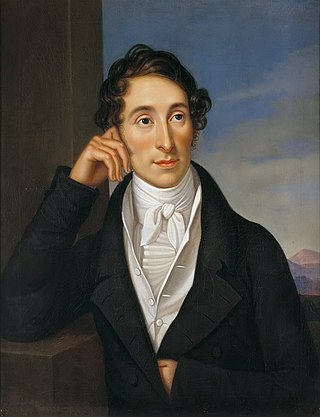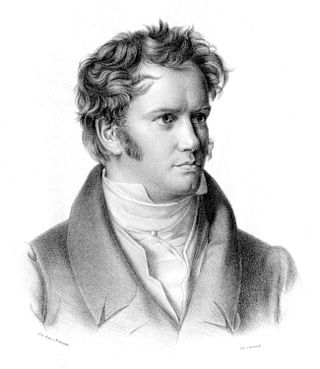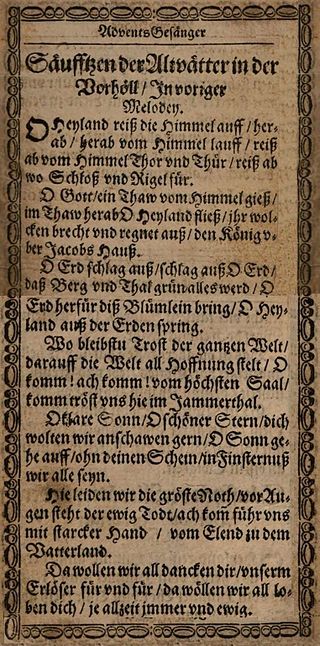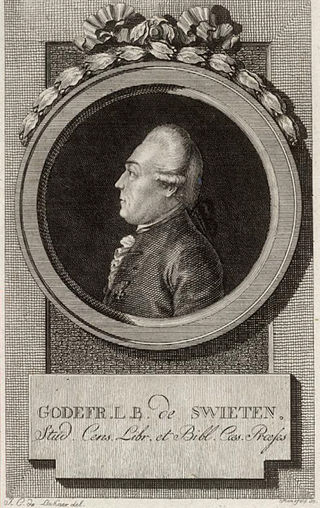Related Research Articles

Carl Maria Friedrich Ernst von Weber was a German composer, conductor, virtuoso pianist, guitarist, and critic of the early Romantic period. Best known for his operas, he was a crucial figure in the development of German Romantische Oper.

Matthias Claudius was a German poet and journalist, otherwise known by the pen name of “Asmus”.

A lullaby, or a cradle song, is a soothing song or piece of music that is usually played for children. The purposes of lullabies vary. In some societies they are used to pass down cultural knowledge or tradition. In addition, lullabies are often used for the developing of communication skills, indication of emotional intent, maintenance of infants' undivided attention, modulation of infants' arousal, and regulation of behavior. Perhaps one of the most important uses of lullabies is as a sleep aid for infants. As a result, the music is often simple and repetitive. Lullabies can be found in many countries, and have existed since ancient times.

Johann Baptist Joseph Maximilian Reger was a German composer, pianist, organist, conductor, and academic teacher. He worked as a concert pianist, as a musical director at the Leipzig University Church, as a professor at the Royal Conservatory in Leipzig, and as a music director at the court of Duke Georg II of Saxe-Meiningen.

Eduard Friedrich Mörike was a German Lutheran pastor who was also a Romantic poet and writer of novellas and novels. Many of his poems were set to music and became established folk songs, while others were used by composers Hugo Wolf and Ignaz Lachner in their symphonic works.

Johann Friedrich Anton Fleischmann was a German composer.

Bernhard Joseph Klein was a German composer.
Franz Schubert's Wiegenlied"Schlafe, schlafe, holder süßer Knabe", D 498, Op. 98, No. 2, is a lullaby composed in November 1816. The song is also known as "Mille cherubini in coro" after an Italian language arrangement for voice and orchestra by Alois Melichar.
"Schlafe, mein Prinzchen, schlaf ein" is perhaps the most famous Wiegenlied, dating from the 18th century.

Seven Sweethearts is a 1942 musical film directed by Frank Borzage and starring Kathryn Grayson, Marsha Hunt and Van Heflin.

"O Heiland, reiß die Himmel auf" is a Christian Advent song. The text was first printed in 1622, attributed to Friedrich Spee; the melody was first printed in 1666.

Two Songs for Voice, Viola and Piano, Op. 91, were composed by Johannes Brahms for his friends Joseph Joachim and his wife Amalie. The full title is Zwei Gesänge für eine Altstimme mit Bratsche und Klavier. The text of the first song, "Gestillte Sehnsucht", is a poem by Friedrich Rückert, composed in 1884. The text of the second, "Geistliches Wiegenlied" was written by Emanuel Geibel after Lope de Vega, and set to music in 1863. They were published together in 1884.

Der Messias, K. 572, is Wolfgang Amadeus Mozart's 1789 German-language version of Messiah, George Frideric Handel's 1741 oratorio. On the initiative of Gottfried van Swieten, Mozart adapted Handel's work for performances in Vienna.

"Zu Bethlehem geboren" is a German Christmas carol. The text is attributed to Friedrich Spee, and was first printed in the collection Geistlichen Psälterlein by Johannes Heringsdorf in Cologne in 1637. The author was unknown until the 20th century, but research of style and content arrived at the attribution. The song was printed with a then-popular secular melody in 1638. The song appears in current Catholic and Protestant hymnals.

"Die Blümelein, sie schlafen" is the first line of the German lullaby "Sandmännchen" (Sandman), from Anton Wilhelm von Zuccalmaglio's collection Deutsche Volkslieder (1840). The melody is based on a French song from the late 1500s which was also used for the Christmas carol "Zu Bethlehem geboren" (1638) to a text by Friedrich Spee.
Theobald Rehbaum was a German violinist, librettist and composer, especially of operas.

Two Motets, Op. 74, are two sacred motets for unaccompanied mixed choir by Johannes Brahms, published together. Number 1, composed in 1877 in several movements, is Warum ist das Licht gegeben dem Mühseligen?, based on Biblical texts and a chorale. Number 2, composed earlier, is O Heiland, reiß die Himmel auf, containing different settings of the stanzas of Friedrich von Spee's "O Heiland, reiß die Himmel auf". The two motets were published by N. Simrock in December 1878 and dedicated to Philipp Spitta.
"Schlaf, Kindlein, schlaf" is a German lullaby.

"Wiegenlied", Op. 49, No. 4, is a lied for voice and piano by Johannes Brahms which was first published in 1868. It is one of the composer's most popular pieces.

"Das Wandern ist des Müllers Lust" is the first line of a poem by Wilhelm Müller, written in 1821 with the title "Wanderschaft" as part of a collection, Die schöne Müllerin. While wandern is defined as "hiking" today, it referred to the required journeyman years of craftsmen when written, in this case of a miller.
References
- ↑ Goretzki, E. and D. Krickenberg (1988). Das Wiegenlied "von Mozart", Mitteilungen der Internationalen Stiftung Mozarteum, Salzburg, July (pp. 114 ff)